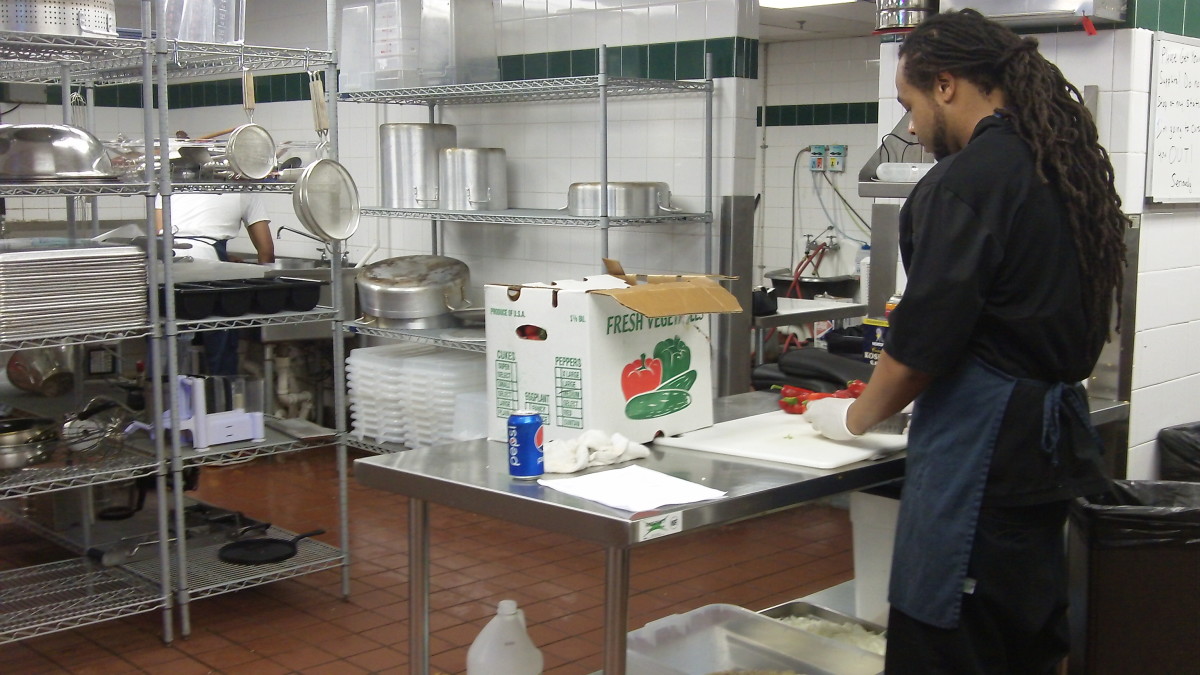Bouldering gym/beer garden combo? Check. Eponymous, locally-made gin? Check. Ivy City is being pegged as the next up-and-coming neighborhood, and Galley cofounder Alan Clifford likes to say he was one of the early settlers.
When the food delivery startup moved in June inside the old Love nightclub on Okie Street, there was still confetti on the roof. “They had a New Year’s Eve Party and they never reopened,” said Clifford.
The building’s 5,000-square-foot basement kitchen is now being leased by the barely eight-month-old startup founded by Clifford and Ian Costello, his former colleague at LivingSocial.
As busy executives at the company, they came to the common conclusion that they had many things on their plate, but a diversified diet was not one of them.
“The only options were pizza, Thai and Chinese,” said Clifford.
So they up and left to create a full-service food delivery company which oversees nearly every part of the process — from prepping to cooking to transportation — leaving the final flourish to the customer.
Meals arrive chilled, ready to be popped in the microwave or oven and plated.
“You feel like you cooked from scratch,” said Clifford. “Without any of the hassle.”
Galley launched in January out of a kitchen at 918 F St. NW, shared with pop-up restaurant space Prequel. When it grew too big for the space, Galley shifted its operations to Ivy City. (Though its corporate headquarters remain in the downtown building, which is also LivingSocial’s former event space.)
Here the glory days of Love — which used to be the city’s largest nightclub, bringing in artists like Beyoncé and Jay Z to the District — have receded. The neighborhood is still gritty; the closest metro stop is a half-hour walk away.
But of course, it’s cheap. Galley’s new kitchen is large enough to accommodate the roughly 15 full-time cooking staff — the company also employs 60 other full-time and part-time workers, including drivers.
“If you’re here early, that’s a positive thing,” said Clifford.
Besides, this mobile enterprise is not too concerned about foot traffic in its vicinity. “We don’t have to be held captive by all the typical things for a restaurant,” said Clifford, who believes that Galley is perhaps the “most operationally complex” startup in D.C.
The company’s day-to-day operations require technology at nearly every step of the process:
- To keep tabs on dishes, Galley maintains a vast database of all its recipes, organized by tags.
- A dispatch system allows the company to optimize the routes of its drivers and update customers in real time.
- The driver app allows Galley to “keep track of basically everything in the ecosystem.”
- The consumer app is where users place their orders with a few taps.
Engineering lead Chris Anderson, another LivingSocial alum, helped develop the company’s logistical hacks. For its bread-and-butter — the menu! — Galley enlisted VSAG, the company that runs Founding Farmers.
Galley receives hundreds of orders per day, though Clifford declined to share exact numbers. But he said its lunch service, launched in July, is on its way to outpacing dinner orders.
Join the conversation!
Find news, events, jobs and people who share your interests on Technical.ly's open community Slack

DC daily roundup: Startup founders offer praise; Howard U breaks application record; NavalX gets new director

DC daily roundup: Washington Post's AI collab; a greentech glossary; Halcyon's debut Climate Fellowship cohort

DC daily roundup: Inside UMCP's new ethical AI project; HBCU founder excellence; a big VC shutters MoCo office

